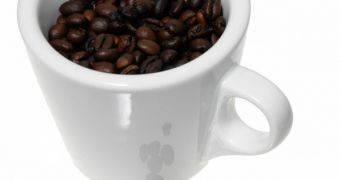High caffeine intake has been recently linked to an increased number of alarming reports from avid users, who say that they experience hallucinations regarding voices or things that are not really there. Those who consume more than the equivalent of seven cups of instant coffee per day usually get their caffeine from chocolate, caffeine bars, coffee, tea or caffeinated energy drinks and say that, on occasions, they hear voices of people who aren't there and see things that aren't actually happening.
Scientists say that those who drink less than the equivalent of one instant coffee cup per day reported no such experiences, so they assumed that nutrition had an important role to play in the onset of hallucinatory experiences. Understanding exactly how the two are linked could give them a new way of fighting this condition in people suffering from it, in that new diets and a change in lifestyle could rid them of the problem without the use of drugs.
During the experiments, conducted by a team of scientists from the Durham University, and led by author Simon Jones, PhD, from the university's Psychology Department, approximately 200 students were asked to report their regular levels of ingested caffeine. Based on the results, Jones argues that the stress hormone cortisol may be the one responsible for the exacerbation of the participants' mental conditions.
When the body is under stress, it releases this chemical, which is also associated with high intakes of caffeine. Publishing in the academic journal Personality and Individual Differences, the team says that this extra boost of cortisol, which is more than the body can handle, could trigger the hallucinations.
"This is a first step towards looking at the wider factors associated with hallucinations. Previous research has highlighted a number of important factors, such as childhood trauma, which may lead to clinically relevant hallucinations. Many such factors are thought to be linked to hallucinations in part because of their impact on the body's reaction to stress. Given the link between food and mood, and particularly between caffeine and the body's response to stress, it seems sensible to examine what a nutritional perspective may add," Jones says.
"Our study shows an association between caffeine intake and hallucination-proneness in students. However, one interpretation may be that those students who were more prone to hallucinations used caffeine to help cope with their experiences. More work is needed to establish whether caffeine consumption, and nutrition in general, has an impact on those kinds of hallucination that cause distress," concludes Dr Charles Fernyhough, the co-author of the study, also from the Psychology Department at Durham.

 14 DAY TRIAL //
14 DAY TRIAL //